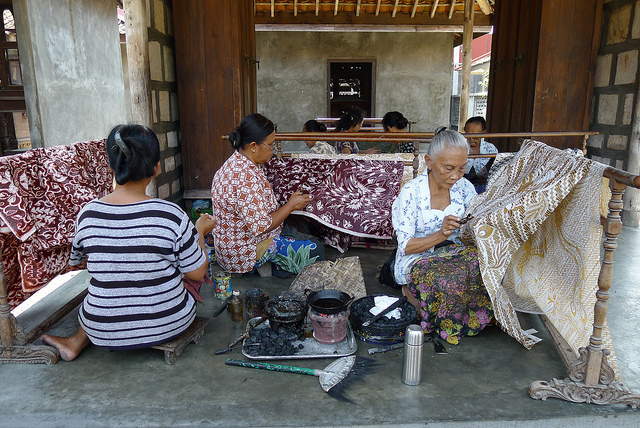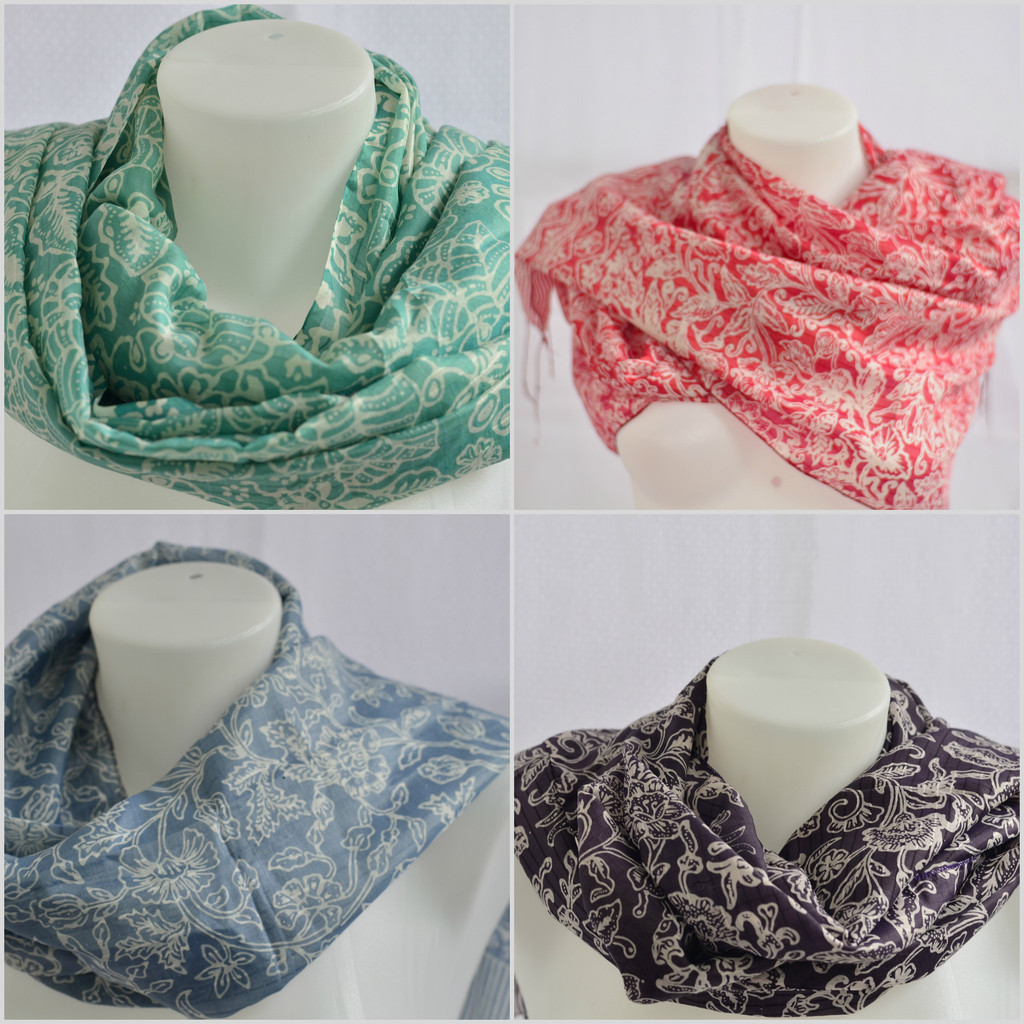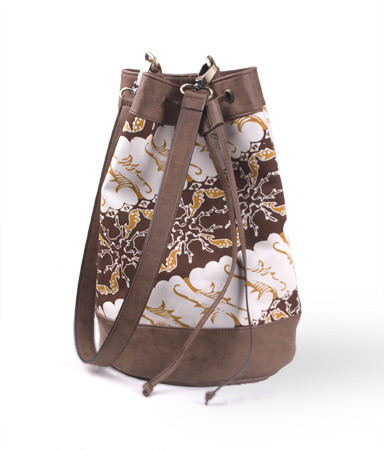By Kristi Alexandra
@kristialexandra
It’s 30 degrees in West Java, Indonesia, mid-day. Several women in a small, creative village community are dedicating their day to creating batik textiles.
In their workshop, they pore over painstakingly intricate designs, dragging tjantings—instruments with a teak wooden handle and a brass or copper spout dispersing melted bees wax—over large swaths of cotton.
The wax, simmering over hotplates, has to be just the right temperature before being poured into the tjanting. Too hot, and the wax will flow too freely, muddying up what should be perfect, fine, continuous lines. Too cold, and the tjanting will get clogged, preventing the wax from forming on the fabric.

Designs range from the auspicious falcon, a symbol of connection to the heavens, to celestial-themed stars and suns, to tropical flora—each motif bearing a unique significance to Indonesian culture.
The fabrics are boiled in cauldrons of natural dyes, ranging from powdered indigos to tengar wood brown. They are dyed over, and over, and over again, in multiple colours, creating a depth of design that leaves almost no blank space on the textiles.
The process of making just one batik cloth could take entire days, even weeks. It’s been in practice since the 1500s, deeply rooted in Indonesian society. It’s tedious, thoughtful, therapeutic, inspiring, and tedious again. It’s the antithesis of “fast fashion,” and that’s the ethos that Liza Wajong wants to bring to Vancouver’s fashion scene.
“When we’re talking about sustainability, I can see how fast fashion works,” she says, surrounded by hanging ikat textiles, folded piles of batik cloth, and fashion-forward accessories that she sells through her online shop.
“Everyday they have something in the store and there’s such a complicated flow chart to do business as fast fashion. In the end, it’s probably just a small group of people who get a lot of money compared to the workers. So, in that sense, it’s really in contradiction with the philosophy of the slow fashion movement. That why I think that bringing batik here will actually add to that sustainability movement.”
Wajong is an entrepreneur who’s always the female experience in mind. After migrating from Indonesia in the late ‘90s, she worked with the Pacific Immigrant Resources Society, a non-profit aimed at helping immigrant women with their settlement in Canada.
Her online clothing store, Citranti, boasts high-fashion items using batik textiles made in women’s creative cooperatives in Indonesia. Finely-crafted leather purses, clutches, and accessories bear the handiwork of the batik makers, while silk scarves and traditional wraps flaunt tulis (freehand-drawn) designs.

With a background in community building, Wajong’s passion lies not only in the gorgeous textiles hailing from the country she was born in, but in the emotional and economic well-being of the women whose work she sells. To sell batik through Citranti, the fashion needs to meet three criteria: it must be ethically sourced, it must be sustainably produced, and it must be stylish.
“I think one of the values guiding me is serving women and understanding how vulnerable their world is,” Wajong reveals.
“Giving birth, that’s a big job. When they raise their children, they’re the ones who have the most responsibilities, then all the blame goes to them if something happens with their children. And if the marriage doesn’t work, that’s something else again, because then you have to go outside the house to find food. So you need to earn some money.”
The creative communities that Wajong employs to find her batiks will let women work on a flexible schedule, paying good money per creative piece and letting them choose if they want to work just five hours a day.
“It provides economic means to the women,” she reiterates.
“When it’s labour intensive, it means you can actually provide food to more families that will sustain the life of the families that are in the industry. And moreover, it actually helps the women to still tend to their household. So when I got to know that and understood that, then I could see how significant it is that we need to keep or sustain the industry. The way it works right now, it helps more people. It takes longer to create the fabrics, it takes longer to weave ikats, but there is no factory work involved.”
Because most of the workers are women, Wajong says these creative communities are especially empowering for them.
“There’s so many vulnerabilities in women, so we need to empower them in order to actually help them in trying to be able to progress into different phases of their lives,” she says. “When you get pregnant, you’re vulnerable. After that, you’re also vulnerable because you have to look after the babies, so all this support will be needed.”
Wajong, who has enjoyed years of professional success, is a mother of two. Still, the yearning to find a meaningful career path resonated with her.
“It’s taken 18 years of my life to actually be doing what I want to be doing now,” she admits. “There was nothing in me that was actually my own decision, and I think my liberation came last year. I wanted to say no to things that are not working with me, and I wanted to be honest about it. I said … ‘I need to open this. I need to start this. Nothing can work if I don’t start something that’s meaningful for me.’”

Surrounded by the tapestries, fabrics, handmade purses, and home textiles that are helping Wajong build her ethical clothing empire, it’s clear she’s found meaning. Among her exotic supply, she appears to be inspired by her work. No, scratch that. Empowered.
 Kristi Alexandra is an unabashed wino and wannabe musician. She dreams about fronting a Neil Young & Crazy Horse cover band.
Kristi Alexandra is an unabashed wino and wannabe musician. She dreams about fronting a Neil Young & Crazy Horse cover band.



